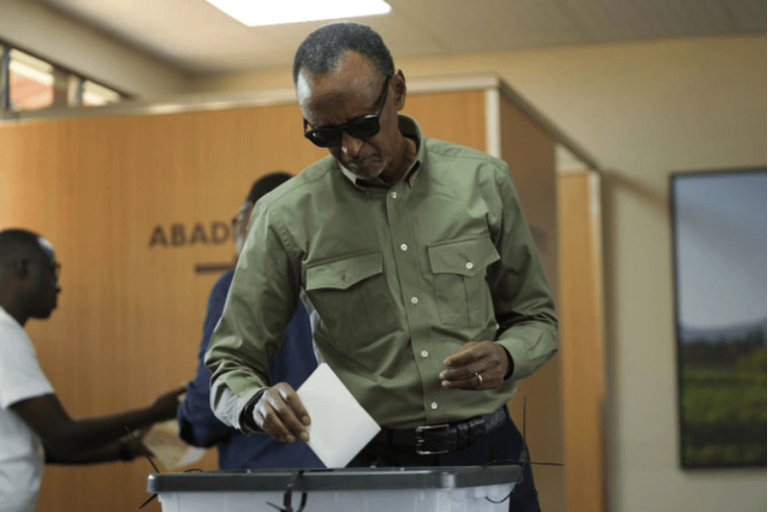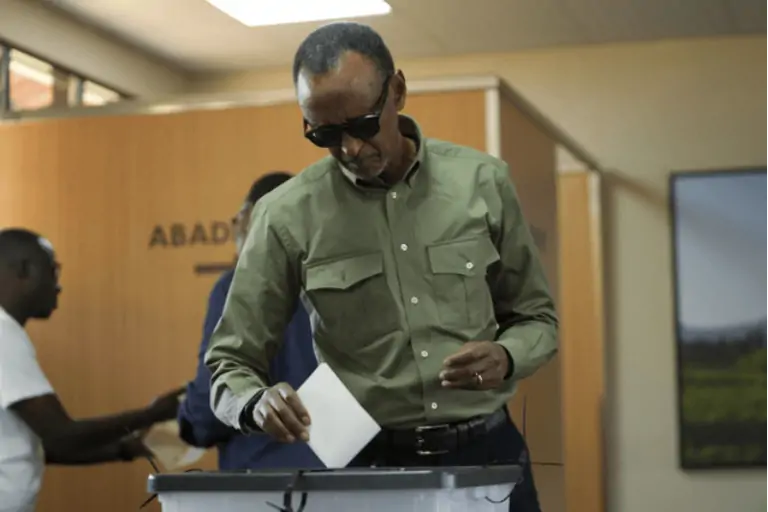

in rwanda's presidential election
Electoral officials state that President Paul Kagame has won 99% of the vote in provisional results from Monday’s presidential election in Rwanda. Given Kagame’s long-standing leadership and desire to keep his three-decade hold on power, this result was well anticipated.
Together, Kagame’s rivals Frank Habineza of the Democratic Green Party of Rwanda and independent candidate Philippe Mpayimana received under 1% of the vote in provisional results counting for 79% of all ballots cast. The outcome is remarkably similar to the 2017 election, in which Kagame similarly got almost 99% of the vote.
Though they could be released sooner, final results are expected by July 27. In this election, the 66-year-old Kagame—who has been in charge since the end of the genocide in 1994—faced almost no notable opposition. Two of his more potent detractors were disqualified from seeking high office.
At some of the capital’s polling locations, Kigali, there were huge queues suggesting notable voter participation. Out of the 14 million people living in Rwanda, election officials said that 9.5 million citizens registered to vote.
“This will be my first vote experience. Passenger motorcyclist Jean Claude Nkurunziza said: “I am voting for President Kagame since I have never seen a leader like him before.”
Since he took over as head of rebels that toppled the government and stopped the genocide in 1994, Kagame has guided East Africa. Originally vice president and de facto leader from 1994 to 2000, he thereafter became president. Although many criticize him as a brutal authoritarian, others applaud him for overseeing remarkable three-decade development after the genocide.
Among the African leaders who have extended their authority by changing term restrictions is Kagame. By voting in a referendum to remove a two-term restriction in 2015, Rwandans let Kagame maybe stay in power until 2034.
He said to reporters on Saturday that the people define his mandate. “The ruling party and Rwandans have been requesting me to stand for another mandate,” he stated. ” Personally, I could easily relax and go home.”
The election in Rwanda coincided with increased anxiety about security in the Great Lakes area of Africa. In a far-off part of eastern Congo, rebels known as M23 are battling Congolese army. A United Nations report released last week claims that between 3,000 and 4,000 Rwandan soldiers are apparently fighting alongside M23. The U.S. government has stated that Rwanda backs the group.
Over severe limitations on human rights, especially freedom of association, in Rwanda, rights organizations keep alert. Targeting the political opposition, Amnesty International lately voiced worry over “threats, arbitrary detention, prosecution on trumped-up charges, killings, and enforced disappearances.” The company said that the silence of dissenting voices—including those of media outlets and civic organizations—has a chilling effect and reduces the forum for public discussion for Rwandan people.
Two mobile telecom leaders, MTN Group and Airtel Africa, joined forces to create a new digital infrastructure system throughout African…
South African President Cyril Ramaphosa defended his nation against claims of white discrimination made by tech magnate Elon Musk. After…
Hilton launched Signia by Hilton for its first appearance in Egypt and Africa through its hotel expansions. These hotels at…
UNICEF reported that, nearly 2900 people died of cholera across Eastern and Southern African countries while children suffer most greatly…
Enza, based in the United Arab Emirates, obtained $6.75 million in initial investment funding from Algebra Ventures and Quona Capital.…
US Secretary of State Marco Rubio ordered South African Ambassador Ebrahim Rasool to leave America by March 21 because he…
This website uses cookies.